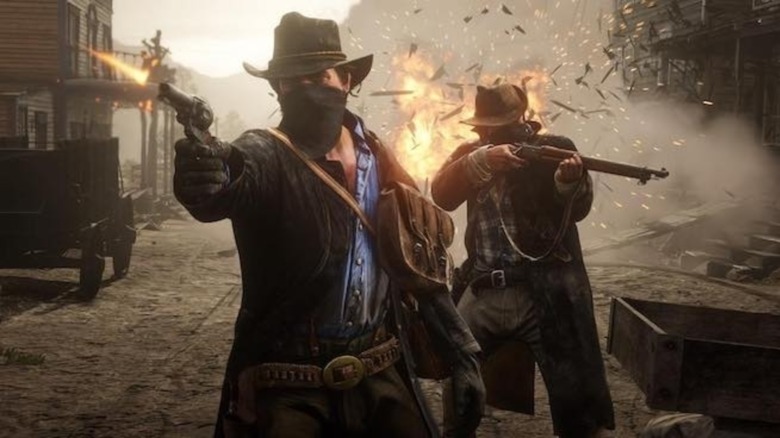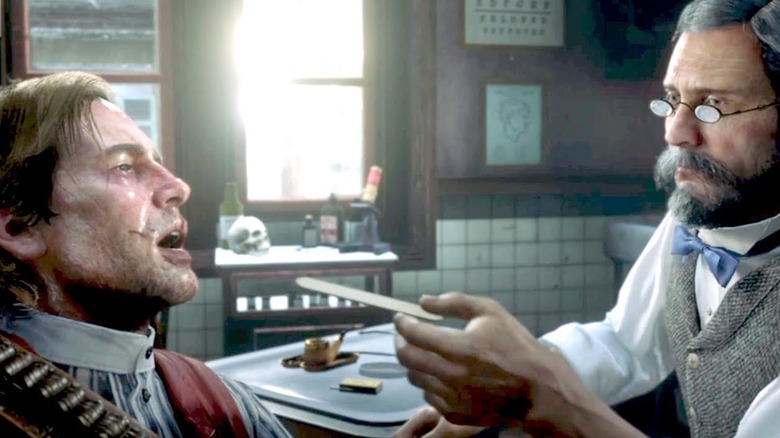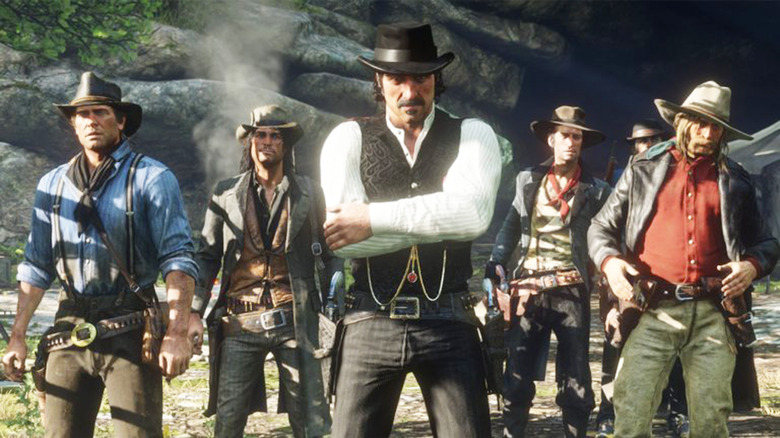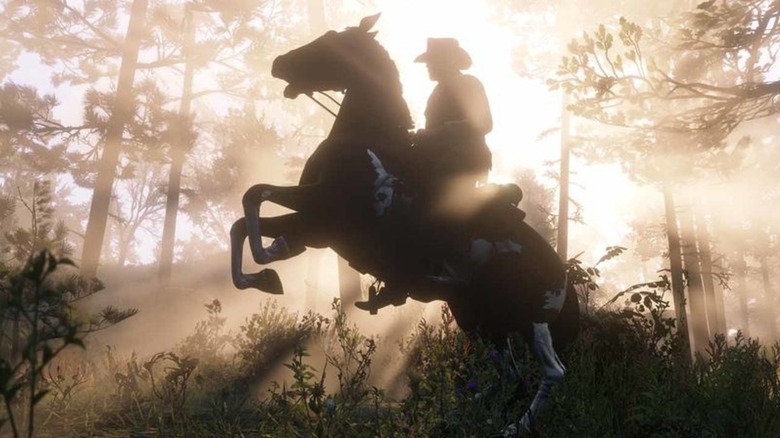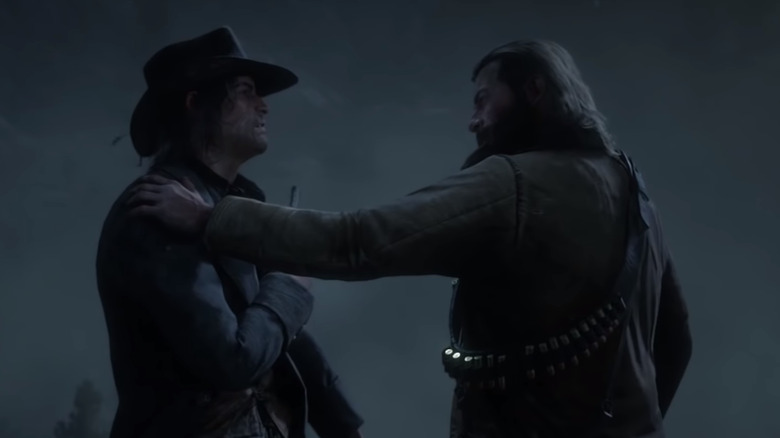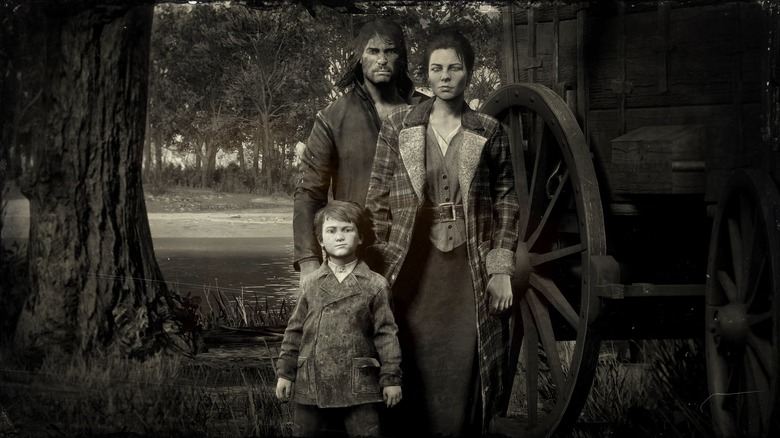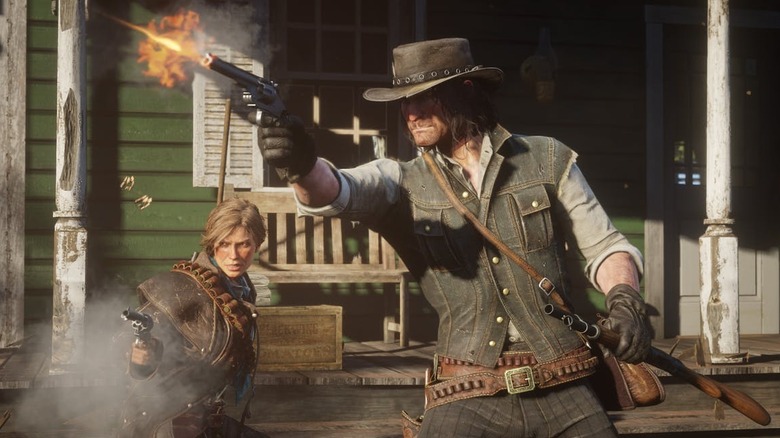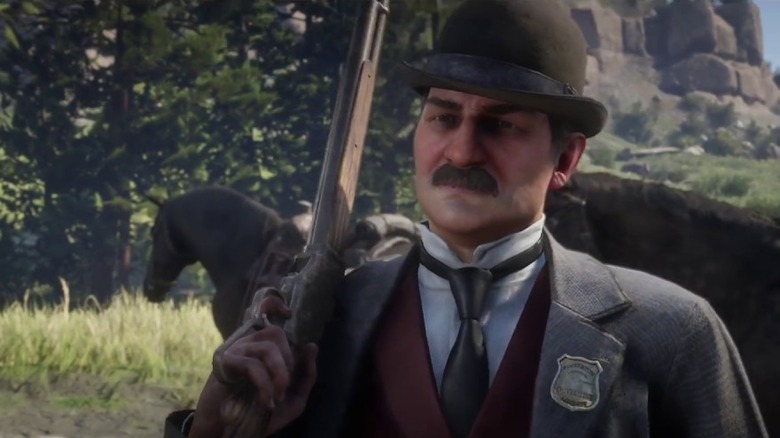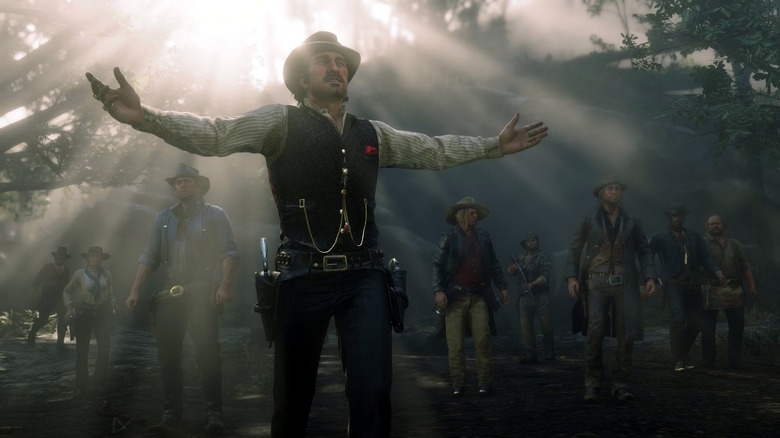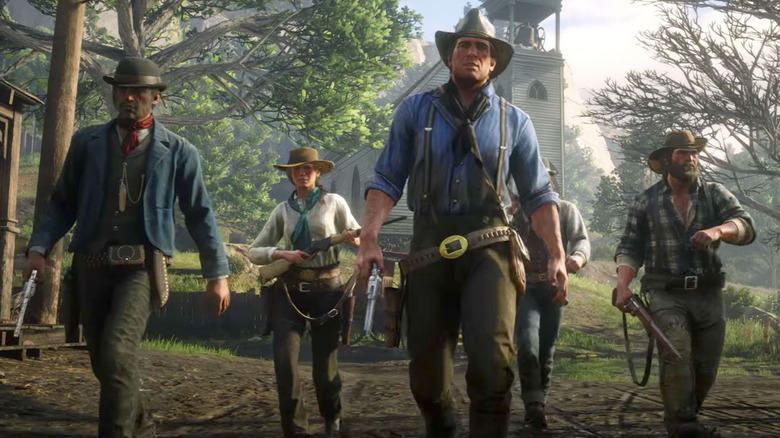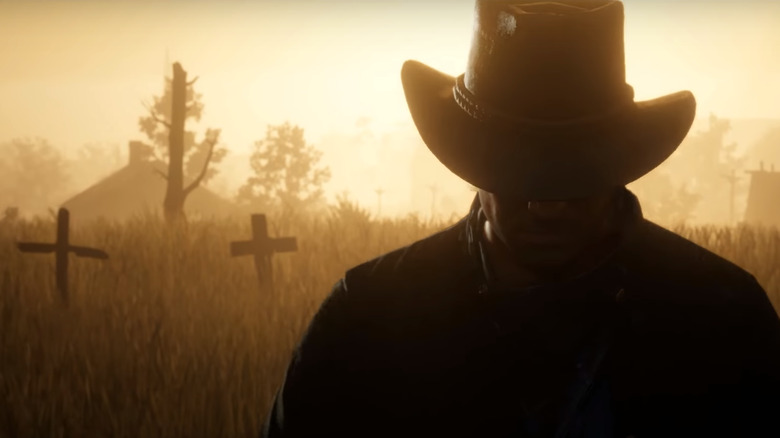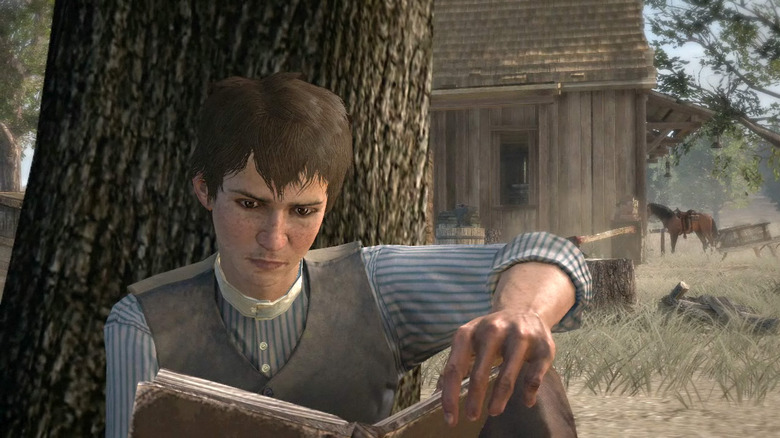The Ending Of Red Dead Redemption 2 Explained
Despite its colossal world, gorgeous visuals, twisted satire, gunslinging showdowns, and plethora of things to see and do, Red Dead Redemption 2 is ultimately a story about people. When you look past all the random chaos, UFOs, and other awesome Easter eggs, there's an amazing story connecting the Van der Linde gang. Considering that most Red Dead vets knew what was going to happen to the crew from the events of the previous game, Rockstar still threw plenty of surprising curveballs our way, painting an amazing picture of both ruthlessness and humanity.
Let's step over the smoldering O'Driscoll corpses, reload our revolvers, giddy-up our horses, and break down just how Dutch's gang fell from grace. Since this can be as shocking as finding a snake in your boot, here's our first and only warning shot: there are massive spoilers ahead. Now that's out of the way, let's go through our list of bounties, and it all starts with protagonist Arthur Morgan.
From gunsmoke to black lung
In an early mission, Arthur has to collect a loan-shark debt from Thomas Downes, who was a poor farmer with a bad cough. Prior to Leopold Strauss' debt-collection mission, Downes can be seen on a street corner taking donations for charity and breaking up a bar fight before it turned fatal. The short exchange between Arthur and Thomas seems minuscule in the context of Red Dead Redemption 2's escapades, or even the other debts to collect, but it's integral to the main plot. Thomas' one cough in Arthur's face would ultimately result in Arthur getting diagnosed with tuberculosis in Chapter 5.
After the TB diagnosis, Arthur changes. He's no longer acting vile to everyone, and his interactions become much more pleasant. Most of the early strangers' missions were driven by money for Arthur, but after the diagnosis, they turn into simply doing the right thing. He encourages John Marston to take his wife and son and run away from the gang for their safety. He also lets Strauss' last debtors go. This is arguably one of the biggest changes ever seen in a Rockstar character.
Dutch masters betrayal
As Arthur's personality changes throughout the game, so does Dutch's. Both games' protagonists describe Dutch as an idealist: a Robin Hood-like frontman who wanted to maintain the freedoms of the Wild West and hold off America's greed-fueled, industrialized taming of it. Dutch spent his entire life trying to be a philosophical outlaw, but both history and the game prove his crusade was futile.
With all of this happening, you would think that Dutch would be empathetic to the plight of the Wapiti Tribe of Native Americans, who are being systematically pushed off their land. Unfortunately, Dutch simply treats them as pawns for another heist. The leader who cared about the poor and disenfranchised sheds another layer of his identity, revealing himself to be a money-obsessed man of power, which puts him in the same lot as Leviticus Cornwall and Angelo Bronte as influential people who exploit those beneath them in order to get rich.
Even worse is how Dutch treats the Marstons, who are family to him. Both Abigail and John are captured during the Saint Denis bank heist, but Dutch refuses to stage a rescue, knowing they'd likely hang. When Sadie Adler and Arthur rescue John, Dutch rebukes them, despite wanting Arthur to free both Micah Bell and Sean MacGuire earlier in the game. Arthur's rescue of Abigail resulted in the revelation that Micah was the Pinkertons' informant, who all the while was in Dutch's ear.
Breaking Buell
As Arthur tries to escape the Pinkertons with John, his horse gets critically injured and dies. Despite being chased and John telling him to hurry, Arthur takes a moment to comfort his critically-injured horse and thank it before dying. If Arthur did the Chapter 6 side missions for Hamish Sinclair, you see the two men become good friends across multiple side missions during later times in both of their lives when they each needed a friend the most. Unfortunately, Hamish dies and gives his beloved horse, Buell, to Arthur as a parting gift. If you happen to be riding Buell while fleeing the Pinkertons, it adds even heavier emotions and a deeper meaning to the horse death scene vs just a random steed you were riding. You can also do Sinclair's side missions as John later on during the game's epilogue if you didn't do them as Arthur, which results in a similar outcome for Hamish but with different dialogue.
Firing the derringer
Right after Arthur accuses Micah and the Pinkertons arrive, the game gives the player a choice: help John get back to his family or head back to camp to retrieve the heist money. Final Fantasy 7 Aeris moment here: Arthur never walks away from either choice. If you go back for the money, Micah will knife-fight Arthur in the camp's burning remains. If you help John get away, Micah will fistfight Arthur on a mountain top.
Both of these fights with Micah have different outcomes depending on your honor. If you go back for the money with low honor, Micah stabs Arthur to death. With high honor, Micah runs away after losing an eye, and Arthur dies in peace. If you help John escape while having low honor, Micah will shoot Arthur in the head. Having high honor at this part results in a similar ending of Micah running away, but with Arthur seeing one serene final sunrise in peace during his dying breaths. Also depending on your honor, you'll get an ending of Arthur's recurring dream sequences featuring either a deer getting enveloped in light (high honor) or a wolf in a storm fading into the dark (low honor), which is symbolic of his personality based on the player's honorable/dishonorable actions, and could be interpreted as Arthur going to heaven or hell due to his actions.
The American Dream
Similar to the first Red Dead Redemption making a grown up Jack Marston the playable character after John's death, this game's epilogue puts you in the boots of John, who is trying to make an honest living with his wife and son years after Arthur's passing. Unfortunately, John keeps resorting to guns for various reasons, resulting in Abigail leaving with Jack since she believes the outlaw gunman in her husband will never die. To try and win his family back, John eventually buys land at Beecher's Hope with bounty money he earned with Sadie and builds the house the Marstons owned in the first game with remaining gang members Charles Smith and Uncle.
As John Marston, Thomas Downes, and even Clint Eastwood's character William Munny in the film Unforgiven suggest, living as a farmhand/rancher during this time is full of low-paying, tough work. Honest, hard-working Americans were mostly unable to prosper during this time. John's turn towards bounty hunting to pay off his loans is a grim reminder that the gunslinger inside him is who he truly is, despite his attempts to suppress it for a more wholesome way of life. This coincides with Cornwall, Bronte, and even Dutch's ways, which is a major theme of both games: spreading "civilization" and gaining prosperity in the Wild West usually involved the deaths of many other people, whether it be outlaws with a bounty, Native Americans living on desired land, or simple cattle rustlers.
The Good
John can find out what happened to the rest of the gang via in-game encounters. It's easy to miss these characters if you don't visit their specific locations. Simon Pearson can be found running the general store in Rhodes. Tilly Jackson can be found in Saint Denis, married to a wealthy man and visibly pregnant. Mary-Beth Gaskill became a successful novelist, and can be found at the Valentine train station. Reverend Orville Swanson, who sobered himself up from both alcohol and drug addiction and quietly left the gang during Chapter Six, is mentioned in a newspaper article, detailing his rise to ranks as a highly successful minister in New York. Unfortunately, the whereabouts of Karen Jones, who heavily descended into alcoholism near the end, are unknown.
There are also nine graves to be found for the deceased members of the Van der Linde gang. Arthur's grave can be found near the mountain where he died. Jenny Kirk's grave can be found at Spider Gorge. Davey Callander, who died during the intro, is buried at Polter. Sean's grave can be found near the old camp location outside of Rhodes. Kieran Duffy's grave is outside of Shady Belle. The graves of Hosea Mathews and Lenny Summers are north of Saint Denis. Ms. Susan Grimshaw's grave can be found close to the remains of the final Van der Linde camp of Beaver Hollow. While not part of the gang, Eagle Flies' grave can be found at Donner Falls.
The Bad
The last part of the game's main story involves a final standoff with Dutch emerging from Micah's shack on Mount Hagen, having recently partnered up with him for the first time since Arthur's death. With everyone engaged in a Mexican standoff, John pleads with Dutch to say something in regards to Arthur, Micah's betrayal, and the situation at hand. Dutch, the man known for his words, confesses he has nothing to say; but he helps John kill Micah and wanders off into the wilderness. After checking the shack, John finds the gang's collected heist score that Dutch knowingly left for John and Sadie, his remaining gang members.
The game's credits depict what happens after the epilogue, showing Pinkerton Agent-turned-Bureau of Investigation Director Edgar Ross and Agent Fordham in various locations. They find Micah's corpse and even track the Marstons to Beecher's Hope. This sets up the events leading into the first game, where Ross and Fordham kidnap Jack and Abigail and force John to hunt down the remaining gang members at large.
After all the smoke settles, the player is free to explore the major locations of the first game (excluding Mexico). Most of these locations are fairly empty with little to do. The town of Armadillo has a cholera outbreak. MacFarlane Ranch is there, but no noteworthy characters are found. The biggest change in New Austin between the two games is the town of Tumbleweed, which is still populated with townsfolk and amenities but slowly becoming a ghost town.
The Ugly
After years of hiding, his failure to stop civilization from domesticating the Wild West, his refusal to believe Arthur's dying words, his blindness to Micah's betrayal, the multiple gang members who have needlessly died (especially Hosea and Arthur), the betrayals of the bureaucrats he wanted to make deals with, and the multiple failed heists or lost scores, Dutch loses many of the key attributes he proudly displayed during the first half of the game. His transformation is similar to Kurtz in Joseph Conrad's novel Heart of Darkness and its film adaptation, Apocalypse Now. Dutch was a leader known for his philosophy, charisma, and words, but he has multiple layers to him and the savage within him emerges several times, such as when he needlessly killed the innocent woman during the Blackwater robbery.
His multiple failures and setbacks combined with years of recluse in the mountains, results in the broken man we met near the end of the first game. He commits suicide, refusing to hand himself over to John and Edgar Ross, because he wanted to die on his own terms and not the establishment's. His final words to John reveal his paradoxical core, having failed to suppress both the changes in the world and his own savage nature. Of course, his last words also foreshadow Ross' betrayal and John's death.
Sunset Riders
While you can find out what happened to most of the remaining gang members, certain ones like Javier Escuella and Bill Williamson are left unaccounted for despite seeing them run away with Dutch and Micah the night Arthur died. We see them side with Dutch and call Arthur a traitor, but they might have been loyal just for the sake of following the heist money and earning their shares. Nevertheless, that's the last we ever hear from them. You can actually visit Fort Mercer, where Bill's new gang took refuge in the first game, but by the end of Red Dead Redemption 2 it's another hangout for the Del Lobos gang. Red Dead vets know Bill and Javier's pasts catch up to them years later. Depending on the player's actions, John or Mexican revolutionary Abraham Reyes kills Bill, and John can kill Javier or hand him over to Ross prior to the hunt for Dutch
Arthur's past
An easily-missed conversation option with Rains Fall reveals a startling revelation: Arthur had a son. As Arthur's TB worsens, he tells Rain Falls about Eliza, a waitress Arthur impregnated in his younger days. Admitting he liked their son, Isaac, Arthur would visit and give them money sporadically throughout the years, despite the outlaw life he was already living. He found out they were both killed for just $10, which made Arthur embrace his sinister and savage side even more. Similar to the good deeds he does near the end of his life, telling this story helps become part of the catharsis he needs in finding his true self beneath the scumbag he was for all those years.
Arthur bottling up the deaths of Eliza and Isaac is reminiscent of John Marston's refusal to talk about Arthur's sacrifice with his family during a later conversation. While John has had problems expressing himself, especially during the awkward exchanges with son, this is yet another RDR protagonist suppressing his sorrowful emotions. John's reluctance to talk about Arthur could explain why he was never mentioned in the first game, despite the sacrifice he gave for the Marstons.
Hitting 21
Throughout Red Dead Redemption 2, you can see Jack's interactions with Dutch's gang members, including his father John (or lack thereof). As a little boy, Jack witnessed people dying, endured all kinds of hardships, and lived throughout the multiple times Dutch's camp was attacked by the O'Driscolls and Pinkertons. He was even kidnapped by the Braithwaite family. All of this, combined with John's inadequate parenting skills, results in Jack being a bit of a recluse during his teenage years, who finds himself enjoying fantasy books and desiring the quiet life of a writer away from the horses and lassos.
John's death at the end of the first game and Jack's upbringing with the gang in the second result in the lone cowboy we meet in Red Dead Redemption's epilogue. The fact that Jack first met Ross while fishing at a river with Arthur is an excellent callback to where Jack kills him years later. While America did tame the West and the age of the desperado for the most part ended, Jack became a gunman just for the sake of getting revenge on Ross, proof that the Wild West's spirit endured in a few remaining people. It all calls back to the tagline of both games that Dutch would also occasionally mention at camp: "Outlaws to the End."

